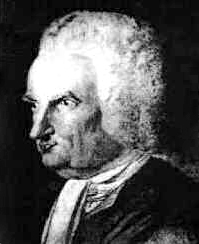James Burnett, Lord Monboddo
| Lord Monboddo | |
|---|---|

Engraving of Lord Monboddo by C. Sherwin, 1787 (after John Brown)
|
|
| Born |
25 October 1714 Monboddo House, Kincardineshire, Scotland |
| Died | 26 May 1799 (aged 84) Edinburgh, Scotland |
| Known for | philosophy, linguistics, jurisprudence |
James Burnett, Lord Monboddo (baptised 25 October 1714; died 26 May 1799), was a Scottish judge, scholar of linguistic evolution, philosopher and deist. He is most famous today as a founder of modern comparative historical linguistics. In 1767 he became a judge in the Court of Session. As such, Burnett adopted an honorary title based on the name of his father's estate and family seat, Monboddo House. Monboddo was one of a number of scholars involved at the time in development of early concepts of evolution. Some credit him with anticipating in principle the idea of natural selection that was developed into a scientific theory by Charles Darwin.
James Burnett was born in 1714 at Monboddo House in Kincardineshire, Scotland. After his primary education at the parish school of Laurencekirk, he studied at Marischal College, Aberdeen, from where he was graduated in 1729. He also studied at University of Edinburgh and the University of Groningen. At Edinburgh University he graduated in law and was admitted to the Faculty of Advocates in 1737.
Burnett married Elizabethe Farquharson and they had two daughters and a son. Burnett's younger daughter Elizabeth Burnett was an Edinburgh celebrity, known for her beauty and amiability. Tragically, she died from consumption (tuberculosis) at the age of 24. Burnett's friend the Scottish poet Robert Burns had a romantic interest in Elizabeth and wrote a poem, "Elegy on The Late Miss Burnet of Monboddo", praising her beauty, which became her elegy.
...
Wikipedia
